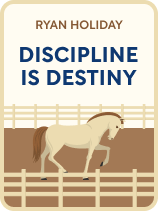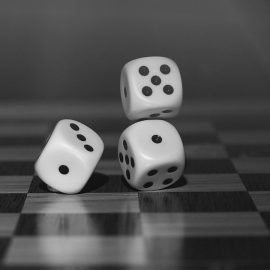

This article is an excerpt from the Shortform book guide to "Discipline Is Destiny" by Ryan Holiday. Shortform has the world's best summaries and analyses of books you should be reading.
Like this article? Sign up for a free trial here.
How does a tidy workspace add to your quality of life? Why should you deliberately subject yourself to unpleasant experiences?
In Discipline Is Destiny, Ryan Holiday explains what discipline is and why it matters. He describes how to practice discipline throughout various stages of your life, which will help you resist urges that will knock you off course.
Read below for an overview of Discipline Is Destiny.
Discipline Is Destiny by Ryan Holiday
In Discipline Is Destiny, Ryan Holiday examines the power of discipline through the lens of the ancient Greek philosophy of Stoicism. Holiday argues that your ability to practice discipline—one of the four cardinal virtues of Stoicism—determines how successful you are (aka your destiny). This is because it dictates whether you work consistently and avoid the temptations that prevent you from attaining or maintaining success.
Holiday is one of the most well-known modern-day philosophers. He has written and co-written several best-selling books on Stoicism, including The Obstacle Is the Way and Ego Is the Enemy. Published in 2022, Discipline Is Destiny is the second book in his four-part series highlighting each of the cardinal virtues of Stoicism. (Courage Is Calling was the first.)
What Is Discipline?
Holiday asserts that discipline is the ability to restrain your baser urges in pursuit of what’s best for you. When you’re disciplined, you act with moderation, and you prize your ability to have total control over yourself. Like all humans, you face temptations, but you can resist these temptations when you need to—and if you do choose to indulge in them, you do so with restraint.
Holiday asserts that discipline matters for four reasons. First, discipline prevents you from taking the four cardinal virtues of Stoicism (courage, wisdom, justice, and temperance or discipline) to extremes and turning them into flaws. For example, extreme courage might also be characterized as recklessness. Since discipline is predicated on practicing moderation, it prevents you from taking the cardinal virtues too far and thus not living a good life.
Second, discipline leads to a good life. Holiday explains that when you’re disciplined, you make better choices with your time: You regularly work to fulfill your purpose (which we’ll discuss in detail later) rather than wasting time with less important endeavors, such as watching Netflix every evening. The more time you spend working on your purpose, the more likely you are to fulfill it—and thus reap the benefits of doing so.
Third, Holiday asserts that discipline lets you keep your good life because it stops you from allowing your emotions or baser urges to take control. When you’re disciplined, you take a moment to actively choose how to react to any situation that you face. As a result, even if you feel powerful emotions, they don’t dictate your actions and cause harmful consequences. For example, despite your fury at your boss, you listen quietly to her scolding and choose to look for another job on your own terms rather than exploding at her and getting fired.
Lastly, Holiday argues that discipline makes you self-aware. You’re able to recognize when you risk overindulging in something potentially harmful and thus stop yourself from doing so. This is true both of physical pursuits, like food or alcohol, and of certain character traits. For example, you may be ambitious, but you don’t take it to the extreme of constantly pursuing power and ignoring other things that matter, like your relationships.
How to Practice Discipline
Now that you know what discipline is and why it matters, we’ll discuss how to practice it. In this section, we’ll first discuss why identifying your purpose is essential to practicing discipline. Then, we’ll discuss how discipline helps set the stage for tackling your purpose and helps you actually fulfill it. Finally, we’ll discuss how practicing discipline can help you effectively face the hardships you encounter—and maintain any success you achieve.
Identify Your Purpose
Holiday argues that to practice discipline effectively, you must first identify your purpose. Discipline requires that you work consistently toward a purpose and avoid temptations that distract you from that purpose. This is impossible if you don’t know what your purpose is. Holiday describes purpose as work that is inherently enjoyable and not something you do in pursuit of external rewards. Truly loving your work is what will allow you to keep doing it despite the many challenges you may face—because while doing the work is hard, not doing this work is unimaginable.
Set the Stage
Once you identify your purpose, you must set the stage to tackle it by preparing your body and environment.
Holiday asserts that taking care of your body ensures you’re healthy enough to pursue your purpose. So eat a healthy diet, exercise regularly, and rest adequately. Eating well supports your health and lets you practice resisting temptation. Exercising regularly and pushing through physical challenges fortifies your ability to push through mental challenges. Getting enough rest provides your body with a chance to restore itself; working excessively to the point of ignoring your body’s needs is not discipline and will likely backfire eventually. And sleeping well improves your ability to make hard decisions.
Holiday also recommends that you straighten up your workspace and your appearance—both of which also set the stage for you to tackle your purpose. He argues that organizing your workspace frees up the mental energy you need to focus on your purpose and reduces the feeling of overwhelm by the massive amounts of information you encounter in your daily life—whether in emails or physical clutter.
Similarly, straightening up your appearance puts you in a better mindset to work than being unkempt. Moreover, your appearance affects how positively others perceive you and whether they want to work with you. While excessively focusing on fashion is undesirable, dressing well may allow you to connect with people who are essential to your work.
Fulfill Your Purpose
Practicing discipline doesn’t just help you identify your purpose and prepare you to tackle it; it also helps you fulfill that purpose by leading you to prioritize your purpose and behave appropriately when you’re working toward it.
Holiday explains that when you’re disciplined, you prioritize your purpose by regularly refusing potential opportunities that would divert your attention from what matters most. Set clear limits regarding what you’re willing to do and with whom you’re willing to speak, and avoid people who try to cross those limits. But don’t try to do it all yourself: Willingly accept or pay for any help that buys you time to reflect on whether you’re doing what’s most important and to actually do that work.
Prioritizing your purpose also requires that you design your schedule around your purpose. Wake up early so that you can focus on the most important work. Doing what matters first not only ensures that you’re not distracted by others’ demands (since they’ll still be asleep), but it also ensures that you actually do the thing you want to do instead of procrastinating—and potentially never getting around to doing it. Once you set this schedule, stick to it every day—even on the days when it’s difficult to do so. Most people struggle to remain consistent. So if you can master consistency, you’ll steadily improve—and ultimately, grow more than those who don’t do it every day.
Deal With Hard Times
As you go through life, you’ll inevitably encounter hardship. However, Holiday asserts that practicing discipline can help you deal with three types of hardship: pain, negativity, and failure.
Deal With Pain
To deal with pain, Holiday asserts that you must practice discipline by learning to tolerate pain. You must fight through your hardships (which are inevitable) if you want to have any chance of success. These hardships may seem impossible to overcome, especially if you’re experiencing significant physical pain or major mental health issues. However, Holiday insists that you must find a way to keep going despite this pain, whether that’s by finding an effective way to deal with it (such as by working through trauma) or by choosing to ignore it so you can work.
Deal With Negativity
To deal with negativity, Holiday asserts that you must practice discipline by resisting the urge to fight back. If someone behaves poorly toward you, you may understandably want to fight against them or defend yourself. But doing so likely won’t improve the situation and may even worsen it. So it’s best to choose not to engage with negativity—even when it seems impossible.
Deal With Failure
Holiday asserts that dealing with failure in a disciplined manner requires that you learn to handle it with grace. In general, don’t treat failure as an excuse to stop; remain persistent and pursue your goals despite the failure. Also, show yourself compassion: Instead of bombarding yourself with negative self-talk when you fail, talk to yourself as you would a friend. That said, don’t prioritize persistence above all else. Pushing forward is virtuous, but if you’re unable to admit that you need to stop because you’re not doing well, you’ll keep going even when you shouldn’t—and ultimately encounter an even more agonizing defeat.
Maintain Your Success
Self-discipline isn’t just important in hard times—it’s also essential to maintaining your success in good times. Holiday asserts that practicing discipline can help you with four things that come with success: ego, pleasure, power, and money.
Handle Your Ego
Holiday asserts that to practice discipline well, you must first keep your ego in check. Your success with self-discipline may make you a role model that other people want to follow, but don’t expect that others will practice discipline just because you are doing so. Instead, focus your energies on your own behavior and let others do what they will. Similarly, don’t let your ego convince you that you no longer need self-discipline. The more successful you become, the greater the temptations you’ll face—but if you want to maintain that success, you need to continue practicing the discipline that made you successful.
Additionally, don’t let your ego tie you to habits that no longer serve you. Holiday warns that you may grow so attached to the habits that made you successful that you stick to them—even when they’re not having the same impact they had before. Prevent this by regularly examining your routines and modifying them if they’re no longer working. Otherwise, you won’t be able to keep up with the world as it changes.
Handle Pleasure
According to Holiday, another way to practice discipline when you’re successful is to look for opportunities to make your life less pleasant, such as by immersing yourself in cold water. Regularly experiencing displeasure will make you unafraid of living without the trappings of success, which may be an essential skill if you ever lose your fortune.
For example, the Roman philosopher Seneca possessed great wealth, but he regularly went without—for instance, by sleeping on the ground—to remind himself that he could handle being poor and that losing his wealth was not as terrifying as it seemed. This habit came in handy when he fell out of favor with the emperor Nero: Seneca was able to willingly give Nero all his riches in exchange for his life because he was unafraid of losing the trappings of success.
Handle Power
Holiday suggests that another way to practice discipline is by learning how to handle power. Contrary to popular opinion, gaining power doesn’t give you extra perks; rather, power is the perk. Therefore, you ought to do more than the people below you—not less, as most are wont to do. For example, when former Defense Secretary (and then-Brigadier General) James Mattis encountered a soldier performing guard duty on Christmas Day, he sent the soldier home to enjoy the holiday and worked guard duty himself—instead of deciding that his holiday off was a perk of power.
Additionally, you must learn to give up power. The most self-disciplined people have control over themselves; as a result, they don’t desire control over others. Moreover, they understand that having too much power often leads to self-destruction—and so they’re willing to give it up.
Handle Money
Finally, Holiday argues that practicing discipline when you’re successful requires you to adjust your view of money. Some people believe that if they make enough money, they’ll be able to do whatever they want. They won’t need self-discipline because they can spend freely and ignore others’ opinions. But while money can make your life easier, it can’t free you from all life’s worries; you’ll still need self-discipline to handle them. So instead of needlessly striving for money that will let you do whatever you want, strive for an amount that allows you to live in accordance with your purpose.

———End of Preview———
Like what you just read? Read the rest of the world's best book summary and analysis of Ryan Holiday's "Discipline Is Destiny" at Shortform.
Here's what you'll find in our full Discipline Is Destiny summary:
- Why your ability to practice discipline determines how successful you are
- How to practice discipline throughout various stages of your life
- Why the greatest enemy to discipline is your ego






